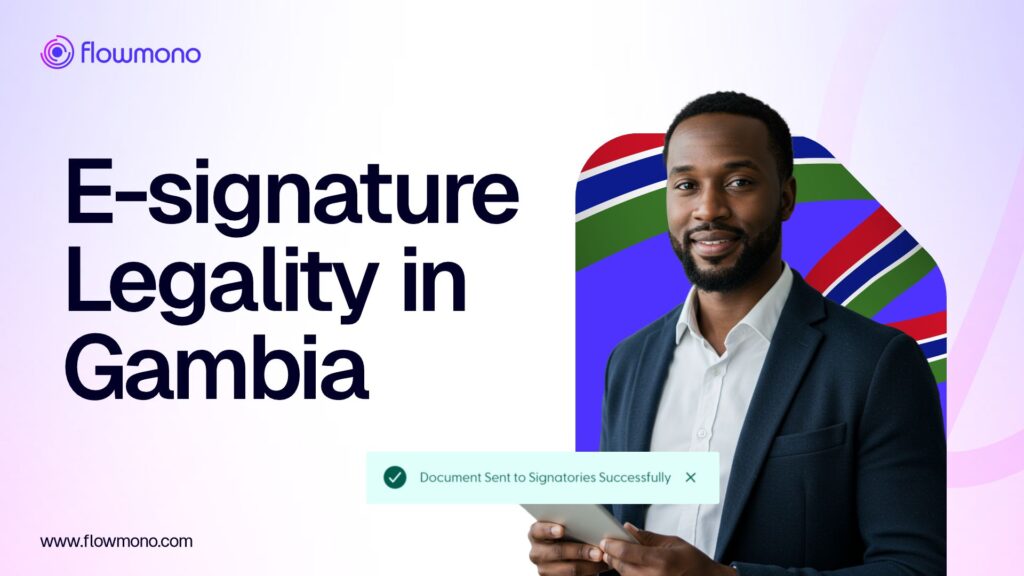
The Gambia, as part of the Economic Community of West African States (ECOWAS), has adopted electronic signature legislation in alignment with regional standards. To support e-governance, consumer protection, and digital commerce, The Gambia’s Electronic Transactions Act grants legal recognition to electronic signatures and electronic records. This framework streamlines administrative procedures, drives digital financial inclusion, and supports modern business practices.
Legal Framework in The Gambia
1. Key Legislation & Regional Standards
- The Gambia Electronic Transactions Act (based on the ECOWAS Electronic Transactions Act) defines the legal framework for electronic documents and signatures.
- The country has endorsed regional standards, including ECOWAS provisions, aligning with UNCITRAL Model Law principles to ensure cross-border trust and technological neutrality.
2. Core Provisions
a. Legal Validity & Admissibility:
- Any electronic contract or signature cannot be denied legal effect merely for being electronic.
- Data messages satisfy legal “writing” and “signature” requirements if they are reliable and appropriate to their purpose.
b. Reliability Standards:
- Electronic signatures are presumed reliable if they are linked to the signatory, under the exclusive control of the signatory, and can detect post-signing alterations.
- Foreign certificates are accepted if they meet substantially equivalent reliability standards.
Documents That Can Be Signed Electronically
The Gambia’s legal framework permits a wide array of documents and transactions to be executed electronically, including but not limited to:
1. Commercial and Service Agreements: Sales contracts, procurement orders, NDAs, employment, and vendor contracts.
2. Administrative & Government Use: E-filings for licenses, tax returns, customs declarations, and regulatory submissions under the Gambia Information and Communication Act and Consumer Protection Act.
3. Consumer-Ecommerce Transactions: Include mobile money agreements, online purchases, and digital contracts.
4. Board Resolutions & Internal Governance Records: Recognized as valid if properly authenticated under the Act.
Many Gambian institutions, including telecom providers and fintech platforms, accept electronically signed documents under these regimes.
Documents That Cannot Be Signed Electronically
Certain sensitive or formal legal documents remain excluded from the e-sign and e-signature regime due to statutory or regulatory requirements:
1. Wills, trusts, and codicils.
2. Notarized documents, such as powers of attorney, affidavits, and property deeds.
3. Court pleadings and judicial filings where wet ink or formal witnessing is required.
4. Negotiable instruments, such as bills of exchange or bearer instruments
These exclusions preserve integrity and public trust in legal processes requiring high evidentiary standards.
Notable Legal Changes & Developments
a. Adoption of ECOWAS Electronic Transactions Model Law
The Gambian law closely mirrors Article 23–35 of the ECOWAS Act and has adopted its definitions, evidentiary presumptions, and cross-border recognition rules
b. Consumer Protection Enhancements
Under the Consumer Protection Act 2014, consumers gain rights in distance selling, such as order review and cancellation, providing safeguards in online agreements signed electronically
c. Future Regulatory Updates
Proposed amendments aim to better define the roles of Certification Authorities and clarify requirements for public agency acceptance of electronically signed documents, particularly for court filings and real estate-related transactions.
Practical Implications & Risk Management
- Platform Security: Businesses must ensure sufficient audit trails, access logs, timestamping, and certificate revocation mechanisms to comply with reliability criteria.
- Cross-border Transactions: If using certificates issued abroad, they must offer reliability equivalent to Gambian standards.
- Consent and Disclosure: Parties should explicitly agree to electronic signature use in sensitive or regulated transactions, in line with legal best practice.
- Financial Instruments and Mobile Payments: While consumer mobile money and e-commerce contracts are likely valid, transactions involving negotiable instruments or real property may still require paper-based processes.
Disclaimer
The information on this site is for general information purposes only and is not intended to serve as legal advice. Laws governing the subject matter may change quickly, so Flowmono cannot guarantee that all the information on this site is current or correct. Should you have specific legal questions about any of the information on this site, you should consult with a legal practitioner in your area.
Conclusion
The Gambia has established a forward-looking legal framework for electronic signatures that promotes digital economy growth, consumer protection, and compliance with ECOWAS-level standards. While certain formal documents remain excluded, most commercial and administrative transactions can now be executed electronically with legal effect.
To leverage this regime fully, organizations should partner with trusted electronic signature providers, maintain reliable systems, and stay abreast of regulatory updates, particularly concerning Certificate Authorities and public authority acceptance.
References
- ECOWAS Electronic Transactions Act, Articles 20–35 (model for Gambia).
- WIPO Lex – Reliability and admissibility standards for electronic signatures (Sections 19–23)
- The Gambia Information and Communication Act (2009) & Consumer Protection Act (2014) – distance selling and online transaction mandates
- Low & Partners article – applicability exclusions and transactional risk considerations
![]()
